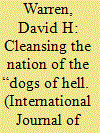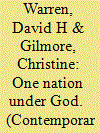| Srl | Item |
| 1 |
ID:
154659


|
|
|
|
|
| Summary/Abstract |
This article contributes to an emerging scholarly debate over the support displayed by key Azhari ʿulamaʾ for the 3 July 2013 coup in Egypt and the subsequent massacres of anticoup protesters. I focus on the Islamic legal justifications articulated by the former grand mufti of Egypt ʿAli Jumʿa, which academics have contextualized primarily in relation to quietist precedents from late medieval Islamic political thought or his Sufi background. By contrast, I consider Jumʿa's justifications as representative of a nationalist discourse that has its historical origins in the protonationalism of Rifaʿa al-Tahtawi (d. 1873). My argument has wider implications for our conceptualization of the contemporary Islamic tradition. If, as scholars have argued, the Islamic tradition is a framework for inquiry rather than a set of doctrines, then in the 19th century a concern for the nation and its future became a key part of that framework. I contend that these additions came to redefine the worldview and politics of the ʿulamaʾ in terms of national progress and its horizon of expectations.
|
|
|
|
|
|
|
|
|
|
|
|
|
|
|
|
| 2 |
ID:
134220


|
|
|
|
|
| Publication |
2014.
|
| Summary/Abstract |
In the wake of the Arab Revolutions of 2011, countries in the Middle East are grappling with how Islamists might be included within a regime of democratic political pluralism and how their aspirations for an "Islamic state" could affect the citizenship status of non-Muslims. While Islamic jurisprudence on this issue has traditionally classified non-Muslims in Islamic society as protected peoples or dhimma, endowed with what the authors term "minority citizenship", this article will examine how the transnational intellectual Wasa?iyya or Centrist movement, of which Sheikh Yusuf al-Qaradawi is the figurehead, have sought to develop a new fiqh of citizenship in which Muslims and non-Muslims have equal civil and political rights. This article will focus on Yusuf al-Qaradawi on the basis that his very recent shift in 2010 on the issue is yet to be studied in depth, as well as in view of the fact that the dilemma faced by reformist Islamic scholars-how to integrate modern concepts into a legal tradition while simultaneously arguing for that tradition's continuing relevance and authority-is for him rendered particularly acute, given that this tradition is itself the very source of his own authority and relevance. It will therefore be argued that the legacy of the Islamic legal tradition structures his discourse in a very specific way, thereby having the potential to render it more persuasive to his audience, and worthy of a more detailed examination.
|
|
|
|
|
|
|
|
|
|
|
|
|
|
|
|